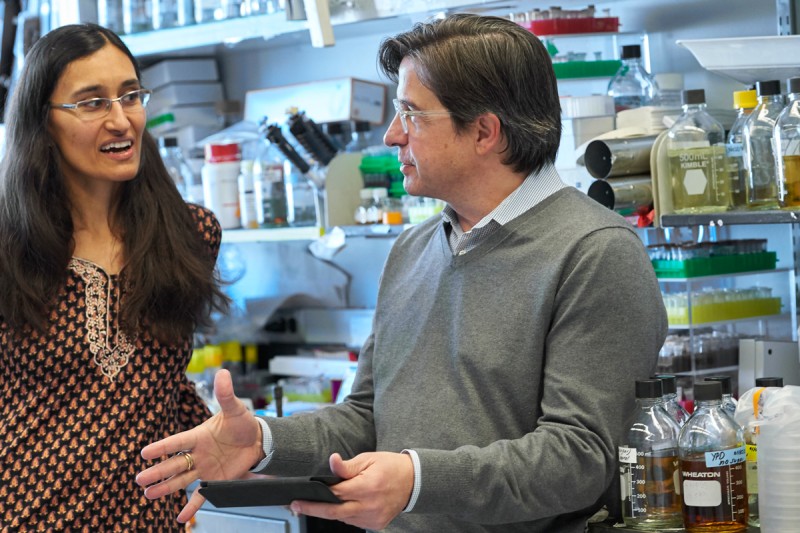
Computational biologist Christina Leslie and molecular biologist John Petrini are helping leverage data from tumor sequencing.
For some biologists, a tumor represents more than an assault on a person’s health — it’s also a source of potential insight into that person’s illness.
“You can think of tumors as a set of naturally occurring genetics experiments, in which normal cellular functions are subverted,” says Memorial Sloan Kettering molecular biologist John Petrini. “Analyzing these mutations can inform us as to how the gene in question works normally and further our understanding of human biology, from normal growth and development to cancer and other diseases.”
MSK recently launched the Marie Josée and Henry R. Kravis Center for Molecular Oncology (CMO) to speed the process by which genetic discoveries made through tumor analysis can be used to produce more-precise treatments for people with cancer. But the wealth of genetic information the CMO generates can also be exploited for insights into basic biological functions well beyond cancer.
To seize this opportunity, MSK has established the Functional Genomics Initiative (FGI), a coordinated effort to analyze data produced by the CMO to shed light on the normal functioning of cells as well as the changes that cause them to become cancerous. Dr. Petrini will serve as founding director for the FGI, which will begin funding MSK projects in early 2015.
Mining a Mountain of Data
The CMO sequences approximately 400 genes in 10,000 tumors a year using a technology called MSK-IMPACT™, and then correlates that information with clinical data regarding the nature of the tumors and how well they respond to treatments. The CMO’s objective is to develop cancer therapies that are individualized — a concept known as precision medicine.
Dr. Petrini explains that this unprecedented genetic output is a fertile resource for MSK’s basic researchers. The FGI will draw on the wide-ranging expertise of scientists and physicians in diverse fields such as stem cell science, molecular biology, and infectious disease to test new theories based on genetic information flowing from the CMO.
“Clarifying basic mechanisms is the cornerstone for understanding biology and advancing cancer research,” Dr. Petrini says. “Underlying all clinical strategies for cancer and other diseases, there’s a history of people analyzing these basic processes as the initial step to figuring out the best way to intervene.”
Back to topBringing Together Diverse Specialties
Dr. Petrini says the FGI will unite scientists and clinicians who normally might not interact as a result of findings unearthed by the CMO. For example, MSK-IMPACT sequencing may reveal that a specific tumor type often has mutations in a particular gene. In many cases, a basic scientist will have expertise in that gene’s function, such as what biological process it normally regulates or how it interacts with other genes.
To illustrate the cross-pollination he envisions, Dr. Petrini cited his recent collaboration with MSK physician-scientists David Solit and Bernard Bochner. A bladder cancer patient in a phase I clinical trial had a remarkable response to a drug that proved ineffective in most other patients in the study. Sequencing that person’s tumor revealed a mutation in a gene called Rad50.
“My lab has studied Rad50 for 20 years, and by coincidence had recently been focusing on the region of the gene that is altered in the tumor,” he says. “Within ten days, we had figured out the mechanism by which the mutation promoted the cancer and at the same time made the tumor vulnerable to the treatment. This finding helps us understand Rad50 and also suggests new therapeutic strategies for any patient with this mutation — regardless of cancer type.”
The FGI will award grants for short-term pilot projects that might last several months and longer-range projects lasting two years.
“We have so much leverage now with this abundance of CMO data, it is critical that we capitalize on this resource,” Dr. Petrini says. “There is a synergy [at MSK] that’s unparalleled anywhere in the world, so it’s important that we enable the basic science enterprise to complement the genomics effort and complete the picture.”
Back to top



